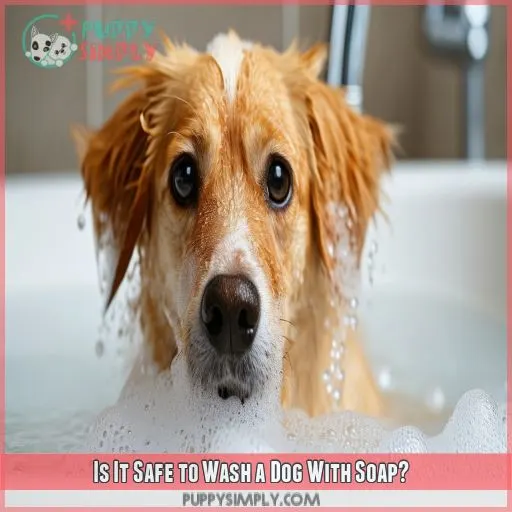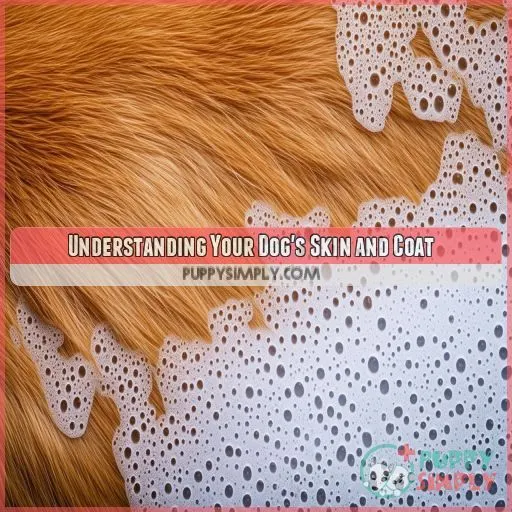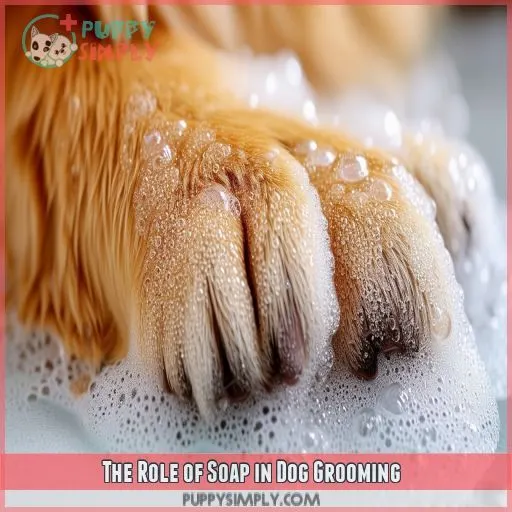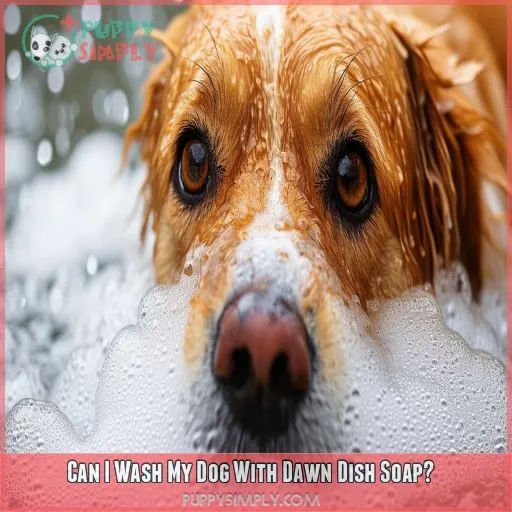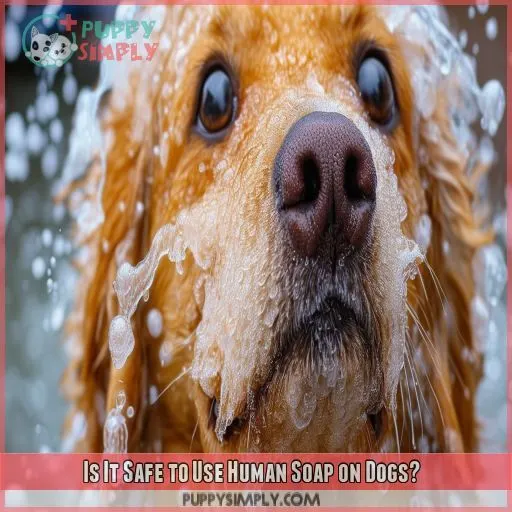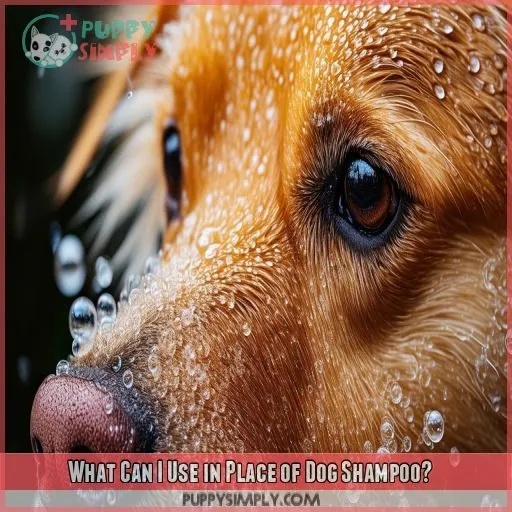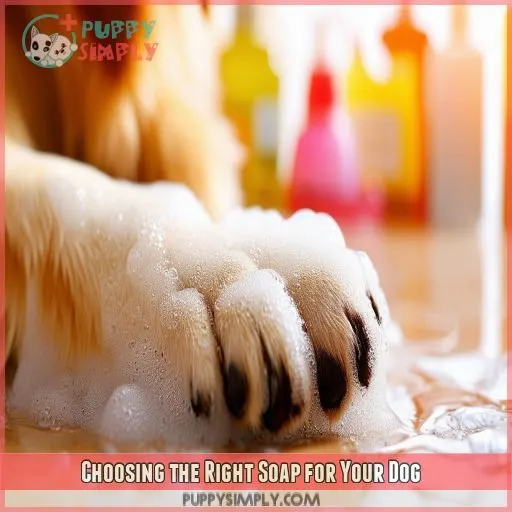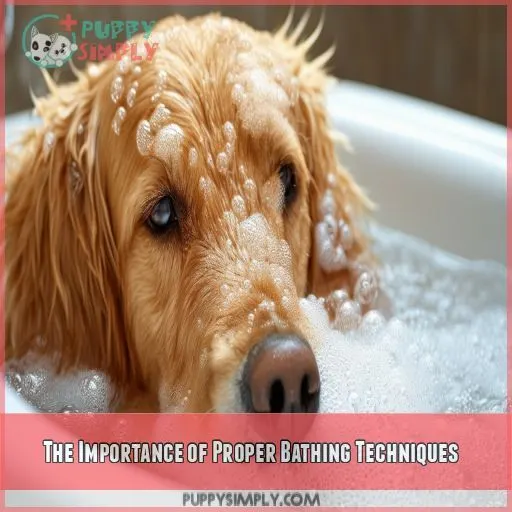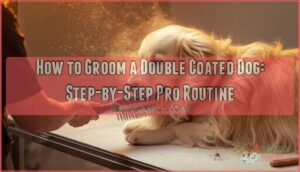This site is supported by our readers. We may earn a commission, at no cost to you, if you purchase through links.
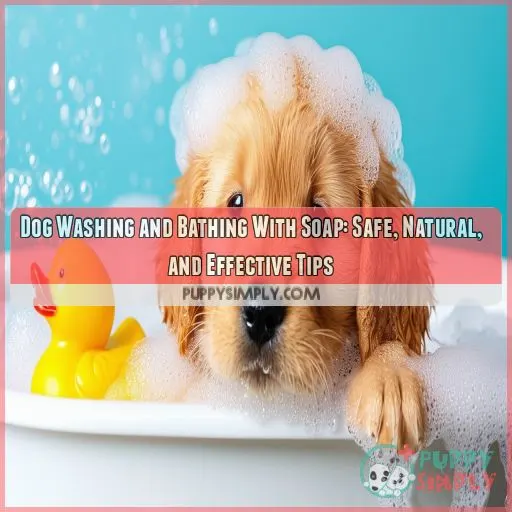
Dog washing and bathing with soap can be safe, natural, and effective when done correctly.
You’ll need to understand your dog’s skin and coat, choose the right soap, and master proper bathing techniques.
From natural ingredients to avoiding harmful chemicals, we’ll guide you through the process of selecting the best soap for your pup.
Let’s explore how to keep your dog clean and healthy with confidence.
Table Of Contents
- Key Takeaways
- Is It Safe to Wash a Dog With Soap?
- Understanding Your Dog’s Skin and Coat
- The Role of Soap in Dog Grooming
- Can I Wash My Dog With Dawn Dish Soap?
- Is It Safe to Use Human Soap on Dogs?
- What Can I Use in Place of Dog Shampoo?
- Choosing the Right Soap for Your Dog
- The Importance of Proper Bathing Techniques
- Frequently Asked Questions (FAQs)
- Is it OK to wash a dog with soap?
- Can I wash my dog with Dawn dish soap?
- Can I wash my dog with human soap?
- What can I use in place of dog shampoo?
- How often should I bathe my long-haired dog?
- Can I use dry shampoo between baths?
- Are there soaps specifically for dogs with allergies?
- How do I clean my dogs face safely?
- Should I use conditioner after washing my dog?
- Conclusion
Key Takeaways
- Choose your dog’s soap wisely – it’s not a one-size-fits-all situation! Think of it like picking out the perfect outfit for a hot date. You want something that suits your pup’s unique skin and coat, not just any old thing off the rack.
- Natural ingredients are your furry friend’s best friend. Ditch the harsh chemicals and artificial fragrances – they’re about as welcome as a skunk at a garden party. Opt for gentle, nourishing ingredients that’ll leave your pooch feeling like they’ve just had a day at the doggy spa.
- Mastering the art of the bath is key. It’s not rocket science, but it’s not exactly a walk in the park either. Get your technique down pat, and you’ll turn bath time from a wet and wild wrestle into a bonding experience that’ll have your pup wagging their tail for more.
- Remember, when it comes to bathing frequency, it’s all about striking a balance. Too much of a good thing can leave your dog’s coat high and dry, while too little might have your furry friend smelling like they’ve been rolling in yesterday’s garbage. Find that sweet spot, and you’ll be golden!
Is It Safe to Wash a Dog With Soap?
Want to keep your furry friend clean and fresh? You might be wondering if it’s safe to use soap. The answer is yes, but it’s important to choose the right kind of soap and use it properly to protect your dog’s health and well-being.
Your dog’s skin is more sensitive than yours, and their sense of smell is much stronger. This means you need to be careful about the products you use on them. Always opt for natural, hypoallergenic dog shampoo or pet soap with ingredients like aloe vera and oatmeal, which are gentle and nourishing. Avoid harsh chemicals and artificial fragrances, which can irritate your dog’s skin and cause negative reactions.
Understanding Your Dog’s Skin and Coat
Your dog’s skin and coat are unique, and understanding their specific needs is key for proper care. Here’s what you need to know:
- Dog breeds and coat types matter: Different breeds have distinct coat types, from short and smooth to long and curly. Recognizing your dog’s coat type is essential for customized care.
- Skin health is a must: Dog skin is more delicate than human skin, making it prone to sensitivities and allergies. It’s crucial to choose products that won’t irritate their skin.
- Breed sensitivities: Some breeds are more sensitive to certain ingredients or scents. Be mindful of this when selecting grooming products to avoid any adverse reactions.
- Coat care is a commitment: Regular grooming and bathing are essential for maintaining a healthy coat. Depending on your dog’s activities and coat type, you may need to adjust their bathing frequency.
- Bathing frequency is key: While most dogs benefit from monthly baths, those that enjoy rolling in mud or swimming may need more frequent cleaning. Avoid over-bathing, as it can strip their coat of natural oils, leading to dryness and itching.
The Role of Soap in Dog Grooming
Now that you understand the unique characteristics of your dog’s skin and coat, let’s talk about the role of soap in dog grooming.
Soap is a key part of your dog’s hygiene routine, serving multiple purposes.
It effectively cleanses your dog’s coat, removing dirt, debris, and odours.
Soap also plays a big role in keeping your dog’s skin healthy.
By gently cleansing the skin, soap helps prevent skin irritation and infections.
When choosing a soap for your dog, go for natural, pet-safe options with moisturising ingredients.
Avoid harsh chemicals and artificial fragrances, as these can irritate your dog’s sensitive skin.
Make sure the soap is specifically formulated for dogs, as human soap may have a pH level that’s too high for your pup’s skin.
The right soap will leave your dog’s coat clean, soft, and healthy, enhancing their overall well-being.
Can I Wash My Dog With Dawn Dish Soap?
Technically, you can use dish soap like Dawn to wash your dog, but it’s not recommended. Here’s why:
- Eye irritation: Dish soap can irritate your dog’s eyes, and it’s difficult to rinse out thoroughly due to the amount of lather it produces.
- Skin irritation: Dish soap is designed to cut grease and eliminate oils, which can strip your dog’s coat of its natural oils, causing severely dry and irritated skin.
- Stomach irritation: If your dog ingests dish soap, it can irritate their stomach.
Instead of dish soap, opt for natural alternatives like castile soap or a gentle, hypoallergenic dog shampoo. These options effectively clean your dog while preserving their natural oils and maintaining skin health.
Is It Safe to Use Human Soap on Dogs?
While it may be tempting to reach for your own human shampoo when bathing your furry friend, it’s important to understand that dog skin and human skin aren’t the same. Dog skin is much thinner and more sensitive, with a different pH balance. Using human soap can disrupt the natural balance of your dog’s skin, leading to dryness and irritation.
It’s best to opt for natural pet soaps that are specifically designed for dogs. These soaps are formulated with ingredients that nourish and protect your dog’s skin and coat. If you’re concerned about the safety of essential oils, choose an unscented castile soap.
What Can I Use in Place of Dog Shampoo?
If you’re looking for alternatives to traditional dog shampoo, there are a few DIY options you can try. You can create your own natural dog shampoo using ingredients like Castile soap, which is a gentle, plant-based soap made from saponified oils. Dr. Bronner’s Pure-Castile Soap is a popular choice, known for its nourishing and cleansing properties. Remember to dilute it with water before use, especially if your dog has a thick coat.
Alternatively, you can explore shampoo bars designed specifically for dogs. These bars often contain natural ingredients like moisturizing oils, aloe, shea butter, and essential oils, offering a pleasant scent. They create a rich lather, making it easy to cleanse your dog’s coat, and they rinse clean without leaving any residue.
When considering shampoo alternatives, it’s important to prioritize your dog’s skin sensitivity. Avoid products with artificial colors, fragrances, and harmful chemicals like methylchloroisothiazolinone and MEA/COCOMIDE DEA. Opt for hypoallergenic and coconut-based cleansers, and always look for natural ingredients that gently cleanse and moisturize.
Choosing the Right Soap for Your Dog
Choosing the right soap for your dog is important for their health and comfort. You’ll want to opt for natural ingredients, avoid harmful chemicals, and be cautious when selecting essential oils.
The Benefits of Natural Ingredients
Choosing the right soap for your dog is really important for their health and well-being. Here are three benefits of selecting natural ingredients:
- Moisturizing and Nourishing: Natural dog soaps often contain ingredients like coconut oil, olive oil, and aloe vera, which are known for their moisturizing properties. These ingredients help keep your dog’s coat soft, healthy, and shiny.
- Gentle and Safe: Natural soaps are typically formulated with gentle, non-toxic ingredients that are safe for your dog’s sensitive skin. They’re free from harsh chemicals, artificial fragrances, and other irritants commonly found in conventional dog products.
- Effective Cleansing: Natural ingredients effectively cleanse your dog’s coat without stripping away essential natural oils. They provide a deep clean while being gentle enough for frequent use, depending on your dog’s needs.
Avoiding Harmful Chemicals
When choosing a soap for your dog, it’s important to avoid harmful chemicals that can irritate their skin or cause other health issues.
Ingredients to steer clear of include essential oils, artificial colors and fragrances, methylchloroisothiazolinone, and MEA/COCOMIDE DEA.
These can lead to allergies, toxicity, or even cancer.
It’s also best to avoid mineral oil, which creates an impenetrable layer on the skin, hindering natural oil production and toxin release.
Choosing Essential Oils Safely
When choosing essential oils for your dog’s bath routine, safety should be your top priority. Here are some key considerations:
- Dilution Matters: Essential oils are highly concentrated and potent. Always dilute them with a carrier oil or water before use. A little goes a long way, and over-exposure can be harmful to your dog’s health.
- Dog Allergies: Just like humans, dogs can have allergies or sensitivities to certain essential oils. Start with a small patch test on your dog’s skin to check for any adverse reactions before full-body application.
- Oil Sensitivity: Some essential oils, like tea tree oil, aren’t recommended for use on animals. Opt for dog-safe essential oils like lavender, chamomile, or peppermint, which offer calming and soothing benefits.
The Importance of Proper Bathing Techniques
Now that you’ve chosen the right soap for your furry friend, it’s time to talk about proper bathing techniques.
Bathing a dog isn’t as simple as lather, rinse, and repeat. The process involves a few key steps to make sure your dog’s comfort and safety. Here’s a quick overview:
| Step | Technique | Tips |
|---|---|---|
| 1 | Brushing | Before wetting your dog’s coat, give it a good brush to remove any mats or tangles. This will make the bath more comfortable for your dog and prevent soap from getting trapped in knots. |
| 2 | Water Temperature | Always use lukewarm water when bathing your dog. Water that’s too hot or too cold can be uncomfortable and even unsafe for your dog’s sensitive skin. |
| 3 | Lather and Massage | Work the natural pet soap into a gentle lather and massage it all over your dog’s body, avoiding the eyes and ears. Take your time and be gentle to make sure your pup has a positive experience. |
Frequently Asked Questions (FAQs)
Is it OK to wash a dog with soap?
Did you know dogs have 3-5 skin cells compared to humans’ 10-15? It’s OK to wash your dog with gentle, natural soap. Use lukewarm water, lather carefully, and rinse thoroughly. Choose products without harsh chemicals for your pup’s sensitive skin.
Can I wash my dog with Dawn dish soap?
While Dawn can remove oils, it’s not ideal for dogs. It strips natural coat oils and may irritate their skin. You’re better off using a gentle, pH-balanced dog shampoo that’s specifically formulated for their sensitive skin.
Can I wash my dog with human soap?
Imagine your dog as a delicate flower. You wouldn’t water it with soda, right? Similarly, human soap’s harsh for your pup’s sensitive skin. Stick to dog-specific shampoos to keep your furry friend’s coat healthy and clean.
What can I use in place of dog shampoo?
You can use gentle alternatives like diluted baby shampoo, oatmeal bath, or coconut oil. For a DIY solution, mix baking soda with water. Always avoid human soap, as it’s too harsh for your dog’s sensitive skin.
How often should I bathe my long-haired dog?
Wondering how often to bathe your long-haired pooch? You’ll want to wash them every 4-6 weeks. If they’re particularly active or dirty, you might need to bathe more frequently. Always brush thoroughly before bathing to prevent matting.
Can I use dry shampoo between baths?
You can use dry shampoo between baths for your long-haired pup. It’ll absorb excess oil and freshen their coat. Just don’t overdo it – dry shampoo isn’t a substitute for regular bathing with water and proper dog shampoo.
Are there soaps specifically for dogs with allergies?
Like a shield for sensitive skin, hypoallergenic dog soaps are your furry friend’s best defense. You’ll find specialized formulas free from common irritants, often featuring soothing ingredients like oatmeal or aloe. They’re gentle yet effective for pups with allergies.
How do I clean my dogs face safely?
Use a damp, soft cloth to gently wipe your dog’s face. Avoid soap near eyes and mouth. For stubborn dirt, try a pet-safe wipe. Be gentle around sensitive areas, and reward your pup for staying still.
Should I use conditioner after washing my dog?
Like a silky coat after a spa day, using conditioner can work wonders. You’ll want to apply it after shampooing, focusing on dry or tangled areas. It’ll leave your pup’s fur soft, manageable, and easier to brush.
Conclusion
Just as a well-oiled machine runs smoothly, proper dog washing and bathing with soap keeps your furry friend in top condition.
By understanding your dog’s unique needs, choosing the right soap, and mastering bathing techniques, you’ll make sure a safe and effective grooming routine happens.
Remember to opt for natural ingredients, avoid harmful chemicals, and use essential oils cautiously.
With these tips, you’ll transform bath time into a positive experience that promotes your dog’s health and strengthens your bond.
Happy bathing!

